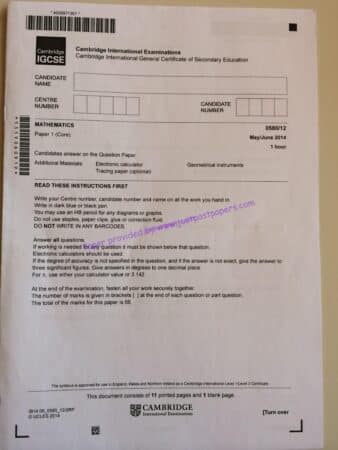
Biology Past Papers IGCSE O Level Cambridge
Examine past papers of Biology to gain the knowledge and strategies required for the examination(Biology Past Papers IGCSE O Level Cambridge). The subject has three parts – the Core, the Extended, and the Supplement. Each part of the exam has its own marking scheme and mark distribution. You should go through these past papers to understand the points covered in the course. The mark schemes and examiner reports will also help you identify the most common mistakes and how you can improve your performance.

The Core paper should be studied by every candidate for the examination. Only a Grade C can be obtained by taking the Core papers. Then, you should learn about the Extended subject content, which covers the Core and Supplement papers. The scientific nature of the subject makes it a challenging one. This is the reason why it’s imperative to choose a course with practical aspects. Hence, Biology Past-Papers are essential for improving your performance and boosting your confidence.
Nature of an exam paper
It’s crucial to understand the nature of a particular exam paper. There are different types of questions. You need to understand the question paper and its marking scheme. There are also past papers for other subjects that you may want to take. However, you should ensure that you choose the correct one. It is important to know the exact format of the examination papers. You should know whether the questions on the exam will be the same or not in other subjects.
The Biology Past Papers IGCSE O Level is a great source of knowledge. They will give you an idea of what you’re expected to achieve in the exam. These papers have all the answers, so you’ll have an excellent chance to improve your performance in the examination. You’ll be able to answer the questions correctly and gain an A*. But if you don’t feel confident enough, you can also hire a home tutor in Lahore and Karachi.
A study guide should have the information
A study guide should have information on the topics and techniques in each paper. You need to learn the theory and how to apply it to practice the subject. If you don’t know how to answer questions in a past paper, you should use a previous exam. Using the biology past papers IGCSE O Level Cambridge will help you to understand the concepts and learn the best methods for solving these tests.
You must have access to the papers of the previous examinations in order to improve your understanding of the subject. For example, you must be familiar with the specification for each of the subjects you need to study. The syllabus is divided into two parts. The Core is the first part of the syllabus and the Supplement is the second. This means that you have to learn the whole subject in one sitting. There are also exams for the different levels.
All candidates should be aware of the content of the Core subject. The Supplement paper covers the entire course and is aimed at those who are aiming for grades A to C. Those who are aiming for a perfect score in Biology should have sufficient knowledge and practice of the subject in order to excel. The CIOAL Tutors will provide you with a tutor in your local area.
The Cambridge IGCSE O Level Biology syllabus
The Cambridge IGCSE O Level Biology syllabus is highly complex and focuses on the development of the subject. The syllabus is a comprehensive description of the subject. The O-level syllabus includes many units. The six-year course is a detailed outline of the course. It is important to study this material thoroughly in order to gain maximum understanding. If you are unsure about a particular topic, it will help you to find answers to the questions that have already appeared in the test.
IGCSE Biology Past Papers provide a comprehensive overview of each topic covered in the course. The IGCSE Biol.610 Exam MCQs are available for download. The IGCSE biology syllabus is easy to understand. You can get these past papers from the Cambridge O Level website. The MBSE Biol.exams.org has many past biology resources. The exam is also the most important part of the IGCSE.
